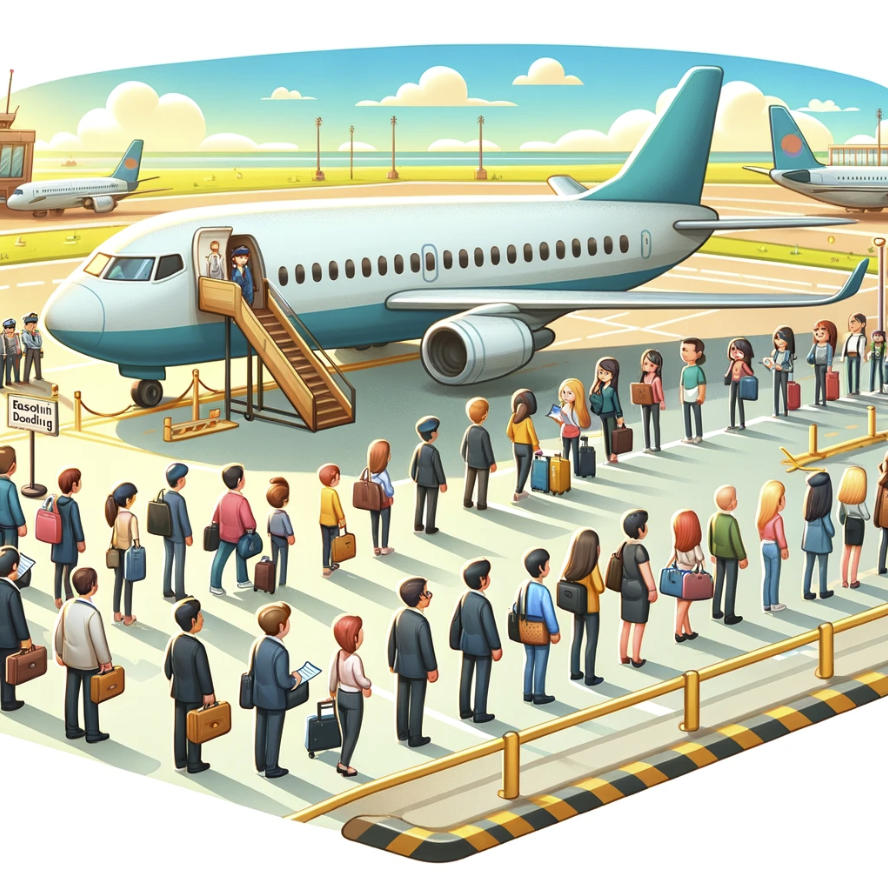Airlines typically organize the boarding process into zones to manage the flow of passengers onto the aircraft.
Each zone corresponds to a specific group of seats or ticket types.
This systematic approach aims to reduce congestion and speed up the boarding process.
It’s generally a bad idea for reasons we’ll explain below. Everyone eventually gets on the aircraft 🙂
Consequences of Early Zone Boarding
If a passenger attempts to board before their assigned zone, several scenarios can unfold:
Staff Vigilance
Airline staff are trained to check boarding passes.
They usually notice passengers boarding out of turn and will direct them to wait for their proper zone.
Potential Delay
Early boarding attempts can disrupt the process, causing delays.
This can lead to a domino effect, impacting the departure time.
Passenger Reactions
Other passengers who are adhering to the rules may feel frustrated, leading to a tense atmosphere.
Airline Policies on Boarding
Airlines have specific policies regarding boarding:
Enforcement of Rules
Most airlines enforce boarding zones strictly to maintain order and efficiency.
Exceptions
Some exceptions exist for premium ticket holders, passengers with special needs, or families with small children.
Consequences for Non-compliance
Passengers who repeatedly ignore boarding protocols might face consequences, ranging from last boarding on future flights to more severe penalties depending on the airline’s policy.
Best Practices for Passengers
To ensure a smooth boarding process, passengers should:
Know Your Zone
Be aware of your boarding zone and wait for its announcement.
Respect the Process
Adhering to the boarding order benefits everyone, ensuring a quicker and more organized boarding experience.
Communicate Needs
If you need early boarding due to special circumstances, communicate with the airline staff beforehand.
Q&A – What Happens If You Board Your Zone Early?
What are the typical procedures airlines follow for boarding passengers?
Airlines generally use a zoned boarding system, where passengers are divided into groups based on seat location, ticket class, or frequent flyer status.
Announcements are made for each zone, inviting them to board in a specific order.
This process is designed to minimize congestion and facilitate an efficient boarding process.
How do airline staff monitor and manage the boarding process?
Airline staff monitor the boarding process by checking boarding passes at the gate.
They ensure passengers board in the correct order according to their assigned zones.
Staff members may also manage the flow of passengers, guiding them to the appropriate lines and assisting with any queries or special requirements.
Are there consequences for boarding a flight before your assigned zone is called?
Yes, there can be consequences.
If a passenger attempts to board before their zone is called, they are usually asked to step aside and wait for the correct boarding time.
Repeated attempts to board early or ignoring staff instructions can lead to more serious consequences, such as being denied boarding or facing penalties from the airline.
How do airlines handle passengers who attempt to board out of turn?
Airlines handle such situations by politely informing the passenger of their correct boarding time and asking them to wait.
If the passenger persists, staff may escalate the situation to higher authorities within the airline, which can lead to stricter enforcement of boarding rules.
Can boarding early affect the overall flight schedule or cause delays?
Boarding early can potentially affect the flight schedule, especially if it leads to confusion or delays in the boarding process.
Effective management of boarding zones is crucial to maintain the schedule, as any disruption can cause a domino effect, leading to overall delays.
What are the policies for passengers needing special assistance or priority boarding?
Passengers requiring special assistance or those eligible for priority boarding, such as families with young children, passengers with disabilities, or premium ticket holders, are typically allowed to board first.
This policy ensures they have ample time to settle in without the pressure of a crowded boarding process.
How does early boarding impact other passengers waiting for their turn?
Early boarding attempts by some passengers can lead to frustration and discomfort among those waiting for their turn.
It can create a sense of unfairness and disrupt the orderly process, potentially causing delays and a less pleasant boarding experience for everyone.
Are there any specific circumstances under which a passenger might be allowed to board early?
Apart from the standard priority boarding for specific categories, airlines might allow early boarding in certain situations, like a passenger with a tight connection needing extra time, or those with unseen disabilities.
These exceptions are usually at the discretion of the airline staff based on individual circumstances.
How do airlines enforce boarding zones and maintain order during the process?
Airlines enforce boarding zones through clear announcements and signage, and by checking boarding passes at the gate.
Staff are trained to manage queues and handle passengers who do not comply with the boarding order.
In some cases, additional security or staff may be involved to maintain order.
What advice do airlines offer to passengers to ensure a smooth and efficient boarding experience?
Airlines advise passengers to:
- Pay attention to boarding announcements and be ready to board when their zone is called.
- Have their boarding pass and identification ready for inspection.
- Follow the instructions of airline staff.
- Be considerate of other passengers, especially those with special boarding privileges.
- Avoid crowding or rushing to ensure a smooth boarding process for everyone.
Conclusion
Early boarding outside of your designated zone is usually noticed by airline staff and can lead to several negative outcomes, including delays and disruption.
Respecting the boarding process ensures a more efficient and pleasant experience for all passengers.


